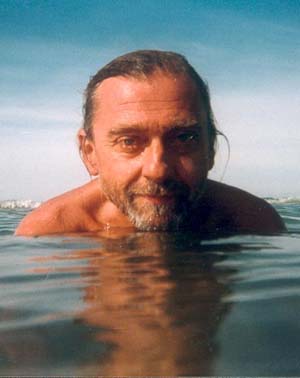By Hugo Verlomme
The following translated from French. The English language title is HUNTING THE DRAGON:
Peter Dixon is familiar and unknown to us at the same time. Familiar because he is one of the fathers of Flipper the dolphin and the author of the biggest selling surf book worldwide, The Complete Book of Surfing, along with others on this subject. He is unknown because in so many ways he contributed to the shaping of surf culture from the 1960s until today. His varied work in other fields remains largely in the shadows.
Peter Dixon grew up along the beaches of Malibu and Southern California . He began surfing in 1950s on the long heavy redwood and balsawood boards of the era. During college at UCLA he became a beach lifeguard; the next step in his evolution as a waterman. He also worked as an underwater stuntman in films and television. In those early days of SCUBA diving there were many fatalities and Dixon
Film work allowed him to cross paths with the producer of Flipper, and Peter wrote the first episode of that perennial television series and several more. He also wrote for favorites like Little House on the Prairie and The Waltons. Novels and nonfiction books followed including the French best thriller of the year award for Attention Les Enfants Regardent (The Children Are Watching) with Laird Koenig. They adapted their novel for film with Alain Delon in the lead role.
His prolific writing allowed him to make a living, raise a family by the sea, surf, dive and travel. Peter and his wife Sarah were one of the very early surf pioneers who rode the waves of El Salvador , Central America . Sarah and Peter have written several books and produced major documentary films for National Geographic, Discovery, CBS News, New Zealand Television 3, National Audubon Society and National Wildlife Federation.
These professional adventures increased his environmental concern for the sea and the plight of dolphins and whales. He met the Cousteaus, Paul Watson of Sea Shepherd, and Phil Eastly, who was probably the first person to dive into a tuna net and rescue trapped dolphins. Phil’s compassion for these marvelous marine mammals inspired Peter to begin Sink the Lucky Dragon.
His novel, combining personal experience and writing know how, gives us a story as exciting as it is informative. The cruel work of tuna fishing in association with dolphins is described with a literary strength as compelling as Sam LaBudde’s documentary video tape showing the death of hundreds of dolphins massacred senselessly in killer nets.
The sea has been raped, ravaged and polluted so savagely that it and we may not survive the onslaught. We are capable today of mapping planet Mars yet we know only five percent of what lies below the oceans’ depths. We should not delude ourselves that the sea is finite. As one of the characters in the novel says, “...by protecting the dolphins it is also humanity we are protecting. If they vanish because of our folly we are likely to follow.”
We have here an exciting novel of the sea, conflicts between strong people of good will and evil, dueling against a background of modern day commercial fishing pirates. Peter’s antagonists are richly evocative of grand characters of maritime literature such as Captain Bligh of the Bounty, crazed Nemo in his Nautilus, Ahab and his mad quest to kill Moby Dick, and Conrad’s MacWhirr of Typhoon.
If we know how to listen and hear the truth of what is said between the lines of Sink the Lucky Dragon, we find a richness that complements an exciting adventure and speaks a vibrant plea to safeguard our most precious gift of nature — the ocean.
Hugo Verlomme
Editions Yago, 2009

No comments:
Post a Comment